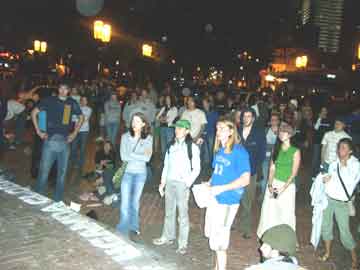I've never been to Uganda. My one adventure oversees happened over thirty years ago. Old folks like me will understand that the memories of that don't seem so distant. That trip was to the British Isles. So I have to imagine Uganda. It helps to see pictures, and now that I have higher speed Internet access videos too. By way of
The Kiva Chronicles I've been alerted to a couple of other blogs:
Carl's Big Adventure and
intocontext and both of them have provided visual images to feed my imagination.
I'm not sure for how long I've been corresponding with Nathan Magumba; it's over four years now. Nathan is nice to have sent me pictures over that time. This is a cropped version of a recent one. I've seen a couple of high school pictures and some snapshots over the years we've known each other. My old computer crashed and I lost some pictures. There's one I wish that I still had of Nathan plowing with an ox-drawn plow. I think of that one often not so much because of the image itself, but the story he told me. It's not a simple matter to lead an ox to plow. There was something very telling to me in his story of the necessity for compassion for the ox, at least to see things from the point of view of an ox. Nathan is able to plow fields with oxen.
The story told about awaking very early in the mornings well before dawn and working in the fields then rushing back for a quick bath then going to school. All this without resentment, to the contrary a sense of privilege. He expressed such gratitude to the family whose farm he worked while going to high school; remembering being cared for when he was sick and trousers bought for him. How he engaged in his lessons at school and remembering his teacher exhorting him and the other students to be all they could become. Nathan has reminded me that he shares the humanist values of the Enlightenment, that history isn't an easy stereotype.
It's been a little complicated that right at the time of starting this blog there are moves on the ground which may affect the future of the BSLA, but now is not the time to share them in public. Nathan's been quite busy suffice it to say, and it's best for me to let him decide what to say when.
He sent me his resume which he wrote to share with those abroad taking an interest in the BSLA. Resumes are such pain to write! There are too many models to chose from. Also from what I can see Curriculum Vitae are more commonly used in Uganda. The important thing in the USA is to get everything on a single page and that doesn't seem the norm there.
The document seems rather stiff to me. It also doesn't convey all the genuine skills he possesses. Since 2002 Nathan has been the Telecentre Assistant, Instructor and Cashier at Iganga Senior Secondary School. The telecentre there was started in conjunction with
SchoolNet Uganda. SchoolNet has been an important bridge across the digital divide in Uganda and in other developing countries.
Through his association with the Iganga Secondary School Nathan has received certification in Introduction to Computers and in Microsoft Applications. He also attended a week long workshop in Computer Maintenance and Repair. He earned a diploma in Computers and Business Management through correspondence with Cambridge International College.
Something I hadn't known before was that right out of his A-Level diploma he taught primary students for a year. For a young man, Nathan has experience in teaching. My degree is in education, and from my little experience I know it's not so easy. I smile thinking about his story of what it means to lead an ox to plow. The key to teaching is empathy; a second key is necessary too and that's knowledge of the subject matter. Nathan knows his way around popular computer software, much less common skills there than they are here. And Nathan has done much to make those skills more widespread where he is. He's taught many people in the community how to access the Internet and to use email.
As I look at his CV I see his experience, and know that it's only a beginning. At times Nathan reminds me: "Rome wasn't built in a day." That's true, of course, but in his workman like composition of his life, it's easy to see he's creating something good.







